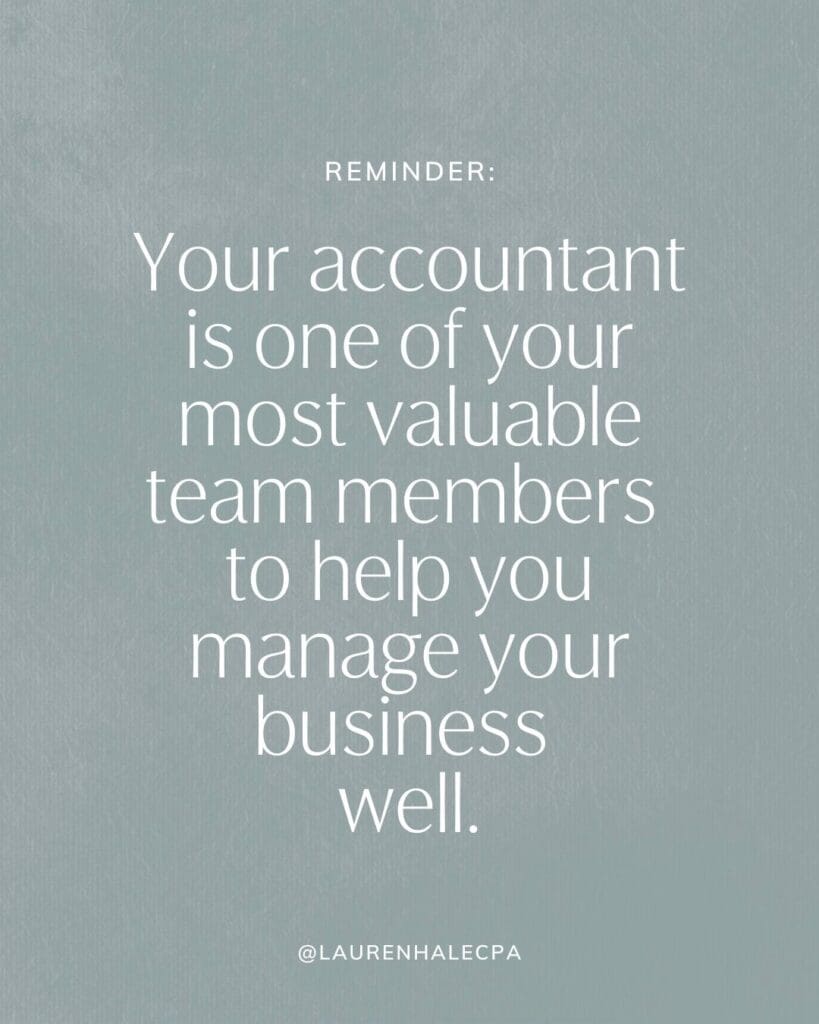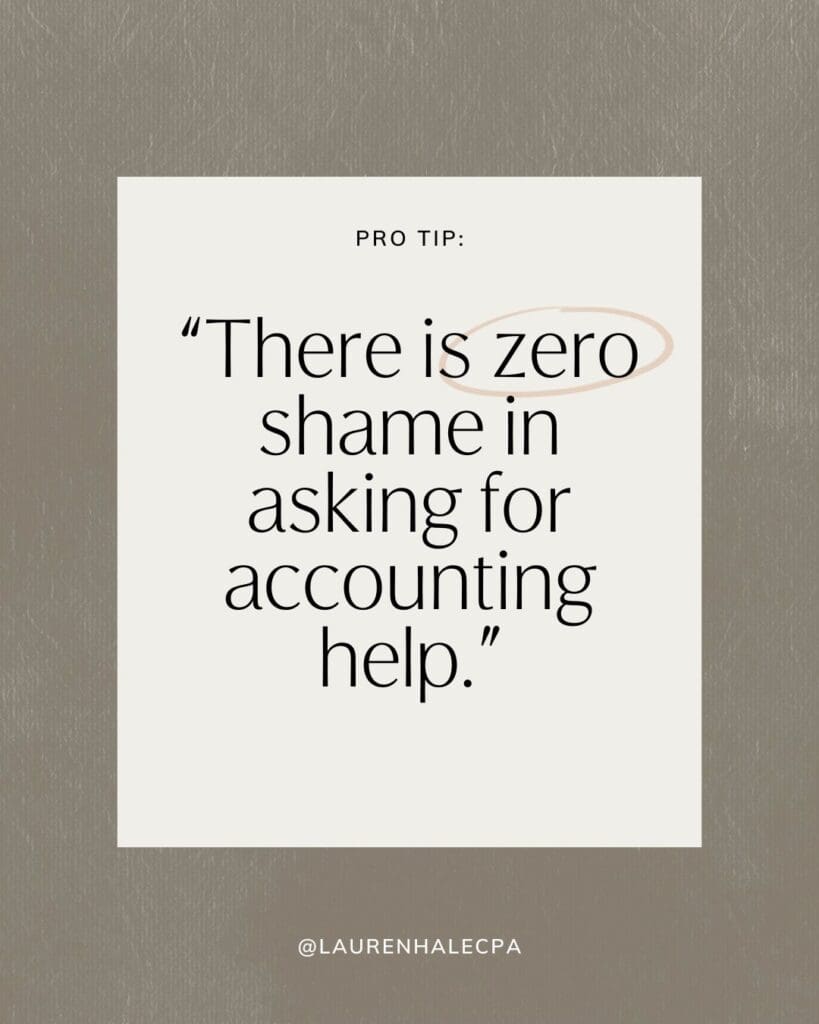So you’ve got a small business up and going! Good for you! You’re one of the 4.7 million American small business owners who are taking the bull by the horns and starting a “side hustle” or a small business each year. But what do you do now? How do you keep track of all the expenses, the income, and OH MY GOODNESS— the receipts? You’ve heard that you should probably hire an accountant. But how? Who? What should you know?
What important questions should you ask potential candidates before you hire that accountant? Are there certain questions you should bring into your initial “interview” and ask throughout the hiring process before you say, “Here’s my bank accounts, now fix it.” After all, one of the best things you can do for your business operations is to have a great recordkeeping system.
Let us take the stress out of your financials for good!

Questions You Should Ask Before You Hire an Accountant for Your Small Business
1. How much experience do they have working as a small business accountant?
When you’re looking to hire an accountant, be sure their license is valid, active, and up to date with the state they are licensed in. It’s public knowledge to find out your accountant’s licensure, and it can be looked up at any time. You can always ask a CPA for their license number. The best candidates should not even balk at giving you that information.
However, even if they have the right license, does not necessarily mean that they are the best fit for you. It takes a skilled accountant to keep up with the tax laws of all the different types of business entities. As well as keeping the best interests of their client in mind.
Not all accountants are created equal when it comes to the unique challenges accounting for small businesses. These types of businesses often use industry-specific software to track costs, budgets, and contractor payments. An accountant who understands how to pull financial data from tools like BuilderTrend, Housecall Pro, Shopify, or other field-specific platforms—and integrate them properly into systems like QuickBooks—can make all the difference.
2. How do they interpret/apply the laws? How much risk are they willing to take?
Are they more black and white in how they interpret tax laws or do they see gray areas? If they are willing to push a rule in an area to get you more tax deductions, are they able to help you back it up? The CPA has to be willing to sign the return, and the client also has to agree on the stance. That’s because, in the end, the client needs to have the proof or backup for what is being shown.
The final say on how much risk you’re willing to take comes from you, the client. However, during the decision-making process, it needs to be discussed.
Even though the CPA still provides advisory services on gray areas—not financial planning—you don’t want your CPA taking risky stances on things if you aren’t a risk taker.
3. Is the CPA willing to tell you something is wrong or illegal if they see it?
Do they actually review your financial transactions or ask questions? Do they just take your word for everything and assume you reconciled your books and did everything correctly?
A good accountant/client relationship should involve more than just uploading documents and sending a bill at the end of every tax season. Think of your accountant as one of your most valuable team members. They’re there to help you manage your business finances well!

Some business owners rely heavily on outside tools to manage projects or run estimates and invoices. But that doesn’t always translate into usable financial statements. A qualified accountant will bridge the gap—ask the right questions and connect the dots so that nothing is missing. This attention to detail prevents year-end scrambling and ensures your reports are truly reflective of business activity.
Ready to take the stress out of your financials?
Chat with our team to see if we’re the best fit as your accountant
4. Will they answer your questions without making you feel dumb?
Let’s face it, accounting and bookkeeping services don’t make sense to everyone. There is a reason that “Accounting 101” isn’t the most popular class on every college campus. The fact of the matter is that not everyone has a “head for numbers” like an accountant.
However, you NEED to understand your business financials.
As a business owner trying to be a good steward of your finances, you want to understand where your money goes and what all those numbers mean.

Don’t be afraid to ask questions so you can clearly understand your financial situation and make informed financial decisions. There is zero shame in asking for accounting help. Financial reports can be confusing at first, and that’s okay! Your accountant should be someone who will answer your questions without making you feel dumb.
While you don’t necessarily need to have your accountant’s personal phone number or have easy access to them around the clock, you should be able to get professional help in understanding your financial documents without feeling like you’re pulling teeth.
5. Do they know their stuff? Have the right licenses?
This one seems obvious, but it bears digging into. Current laws in the US do not require someone to hold a CPA license for tax preparation or bookkeeping, or to file taxes on behalf of someone else.
To prepare taxes on behalf of someone else, all someone has to do is apply for a valid PTIN (Preparer Tax Identification Number) with the IRS. The process to apply is quick and easy. Then they can prepare and sign returns.
You can also be an enrolled agent (EA)—that’s a step up from just having a PTIN and less than CPA. EAs can represent clients before the IRS. The continuing education for EAs is much less. They only have to have 72 hours over 3 years, and 2 must be ethics. Continuing education requirements vary from state to state, but in Texas, CPAs must have 120 hours CPE (continuing professional education) over 3 years and a minimum 20 hours/year, and 4 hours of ethics every 2 years.
There’s a wide range of qualifications when it comes to who can legally prepare your tax returns. All someone needs is a PTIN—just a name, social security number, and a small fee—and they’re allowed to file returns. But there’s a huge difference between that and hiring a CPA who has passed a rigorous licensing exam, holds a bachelor’s degree in accounting, and maintains high continuing education standards. CPAs are trained to navigate complex tax situations and represent you before the IRS, which can be crucial when mistakes happen or audits arise.
You get what you pay for
When you’re dealing with deductions and the idiosyncrasies of categorizing expenses for small businesses, things can get more complicated very quickly. If you choose to work with a bookkeeper or accountant who does not have their CPA license, the experience of working with small businesses, or at least the willingness to dig deep into the tax laws, you could pay way more money in the long run than if you just hired a more experienced accountant with a college degree up front.
If you genuinely want expert advice on your financial management, then you need to hire an accountant who stays up-to-date on tax laws and helps ensure you maintain accurate financial records.
Through the years, we’ve seen some wild returns and books that were way wrong. Due to a small business owner assuming things are right because the one in charge of accounting was taught by someone who wasn’t qualified, or they taught themselves. Going through an interview process to choose the right accountant may feel superfluous; however, having the BEST person, or CPA services firm on board, will end up saving you money and meeting your business’s needs in the long run over hiring the cheapest freelance accountant you can find.
Most small business owners don’t need to hire an accountant as full-time employee or even a part-time accountant even when they are more established! For most small businesses, it makes the most sense to hire professional accountants with a major accounting firm or local accounting firms with financial expertise and several years of experience working with small businesses.
6. How much month-to-month support can they provide?
Are they just categorizing expenses for you? Keeping your bank account and QuickBooks on the same page? Or will they provide a balance sheet, cash flow, monthly profit and loss statements, and a P&L comparison to last year? Are you able to easily pull financial reports yourself and see who you spend the most money with? Or will they help you with that?
While you don’t necessarily expect your accountant to be involved in the day-to-day work of running your business or day-to-day recording of receipts (that’s more of a bookkeeping task), you do want to work with a financial professional who is available to review your financial processes, provide professional services advice, and data-driven insights throughout the year.

Even if you want to do your own bookkeeping and it doesn’t take you much time, is your accountant willing to look over bank statements and other financial statements to give you peace of mind that you have accurate bookkeeping and are correctly categorizing business expenses?
We have found that it generally leads to better operational efficiency (and leads to less stress) to work with an accounting firm that also offers monthly bookkeeping services. They are generally more willing to take some of the financial tasks OFF your plate if you are doing your tax preparation and bookkeeping tasks through them.
Don’t put it on the back-burner
There is not necessarily a right or wrong answer here, but having the conversation upfront sets clear expectations. It also allows you to better communicate your needs as a small business owner.
Business owners often let things slide until January, then spend weeks playing catch-up. It’s far better to work with someone who offers regular check-ins and can help you maintain accurate financial records all year long. Monthly support doesn’t just reduce stress. It helps you make better decisions in real time by giving you clear insights into where your money is going.
7. Do you enjoy working with them?
Now, we know that your accountant doesn’t necessarily need to be your new bestie. That is not typically in the job description when looking for a certified public accountant.
One tends to think more about the tax advice and other financial information that they will learn from an accounting professional. Coffee dates are NOT required to have a good business-owner-accountant relationship by any means.

However, we DO believe that as a small business owner, one of the best perks is that you get to CHOOSE who you work with! Why not choose people with whom you enjoy interacting? Do you FEEL like just another hourly rate when you talk to them? Or do you feel like they genuinely care about seeing you succeed? You shouldn’t dread a phone call or an email from your accountant!
When you’re choosing an accountant, look for more than just the right credentials. Ask yourself how they make you feel. Do they communicate clearly? Do you feel heard and supported? You want someone who will partner with you, not someone who makes you feel like a transaction. A strong relationship with your accountant brings peace of mind, not dread.
The Right Accounting Team Makes All the Difference
Whether you work with a major accounting firm, hire a full-time accountant, a part-time accountant, or even work with your local accounting firm, having the right accounting team on board can help you not just at tax time, but also with your tax filings, deductions, and compliance!
We know that we are biased. However, we truly believe that as soon as you start your business, it is the right time to hire an accountant.
Even if you’re not ready to outsource bookkeeping help, a knowledgeable CPA will help you be in the best possible tax situation, stay on top of all best practices, and lend you years of learning through their personal experience and expertise.
